#Apollinaris
Text

#lily of the valley#muguet#eugene grasset#LA PLANTE ET SES APPLICATIONS ORNEMENTALES#Convallaria majalis#lily-of-the-valley#may bells#our lady's tears#mary's tears#glovewort#Apollinaris#art nouveau#floral drawing#floral illustration
41 notes
·
View notes
Text

drinks
#food#foodpics#foodporn#yummy#breakfast#brunch#lunch#dinner#foods#foodies#foodmyheart#goodfood#foodlover#foodlovers#foodstuff#healthy#tasty#delicious#enjoyfood#enjoyyourfood#fruits#vegetables#vegetarian#inspiration#cooking#cookstuff#drinks#drink water#apollinaris
0 notes
Text

Apollinary Vasnetsov - At Dawn at Voskresensky Bridge (1900)
288 notes
·
View notes
Text
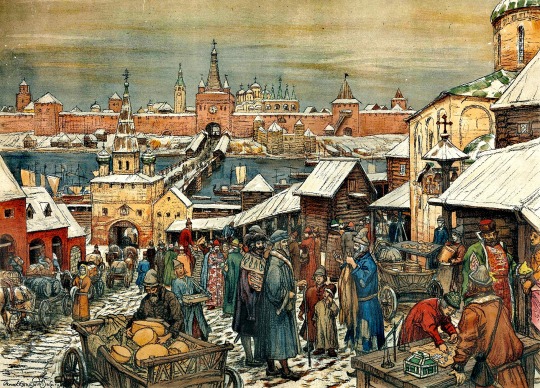
Novgorod marketplace, 1908–1909, Apollinary Vasnetsov
61 notes
·
View notes
Text

Elegy (1893, oil on canvas) | Apollinary Vasnetsov
32 notes
·
View notes
Text

Elegy (Apolinario Vasnetsov, 1893)
17 notes
·
View notes
Text
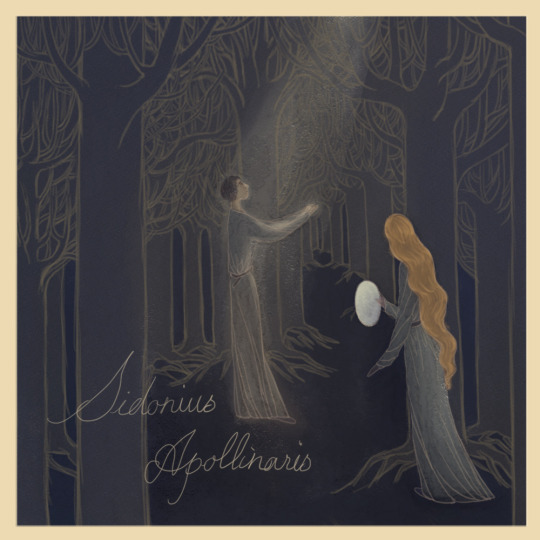
Ragnahilda observing secretly an image of young Sidonius Apollinaris, gallo-roman aristocrat and bishop, poet and prisoner, under the moonlight of a fading world.
*Apollinaris was imprisoned and exiled by the Visigoths for defending Clermont, but was later released. At the request of a friend, he wrote a hymn to Ragnahilda, the Visigoth queen. The verses were carved on a silver basin and presented to her, but Apollinaris did not believe that barbarian women would prefer poetry to silver. Here I used the setting in Jean Marcel's novel Sidoine ou la dernière fête, replacing the silver basin with a mirror. Through that magical object, fair Ragnahilda learned about the Roman’s mysterious fate.
1 note
·
View note
Text
SAINT OF THE DAY (January 8)

St. Apollinaris was one of the first great martyrs of the church. He was made Bishop of Ravenna by St. Peter.
The miracles he conducted in Ravenna soon attracted official attention, for his preaching won many converts to the faith.
However, at the same time, his words and works brought upon the fury of the pagan people who beat Apollinaris cruelly on several occasions.
During one beating, Apollinaris was cut with knives and poured scalding hot water over his wounds, then put on a ship to be sent to Greece.
In Greece, the same course of preachings, miracles and sufferings continued. In fact, after a cruel beating by Greek pagans, he was sent back to Italy.
When Emperor Vespasian issued a decree of banishment against the Christians, Apollinaris was kept hidden for some time, but as he was leaving, passing through the gates of the city, he was attacked and savagely beaten.
He lived for seven days, foretelling that the persecutions would increase but that the Church would ultimately triumph.
2 notes
·
View notes
Photo

Winter scenery - Winter dream by Apollinary Vasnetsov
Canvas Print by AR-shop
3 notes
·
View notes
Text
youtube
The Legio XV Apollinaris was levied by Octavian in either 41 or 40 B.C, and survived at least up until the 3rd century A.D. The legion fought against the Marcomanni, a Germanic people, as well as the Parthians. It is almost certain, given their being stationed in the Middle-East, that they also fought against the Sasanian Persians later on.
#music#farya faraji#roman music#octavian#caesar augustus#first emperor of rome#augustus legio#legio xv apollinaris#devoted to apollo#rome#roman#spqr
4 notes
·
View notes
Text

#lily of the valley#muguet#eugene grasset#LA PLANTE ET SES APPLICATIONS ORNEMENTALES#Convallaria majalis#lily-of-the-valley#may bells#our lady's tears#mary's tears#glovewort#Apollinaris#art nouveau#floral drawing#floral illustration
11 notes
·
View notes
Text
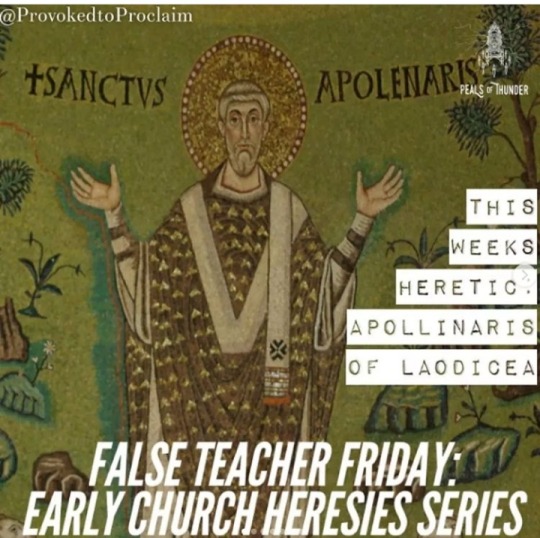

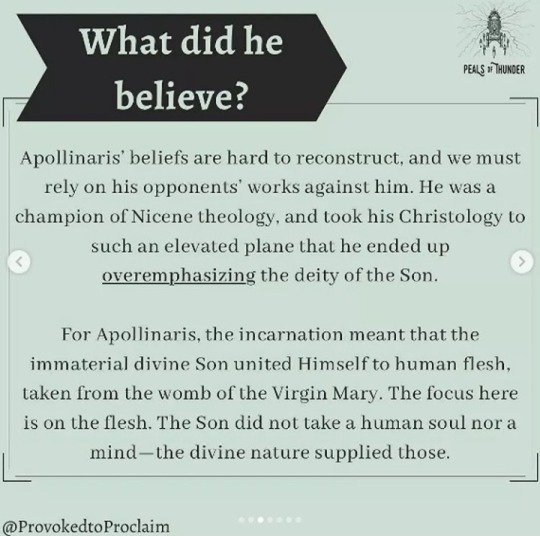




#early church heresy#heretic#apollinaris of laodicea#christian blog#christianity#christians#false teacher#ProvokedtoProclaim
1 note
·
View note
Text

THE DESCRIPTION OF SAINT APOLLINARIS OF RAVENNA
The Bishop and Martyr of Those Against Epilepsy and Gout
Feast Day: July 20
Born in Antioch (Antakya, modern-day Turkey), Apollinaris is a bishop of Ravenna in Italy, and was appointed by the apostle Peter himself. It is not certain that he was one of the seventy-two disciples of Christ, as has been suggested, but he was apparently a disciple of Saint Peter, who may have consecrated and commissioned him as the first Bishop of Ravenna during the reign of the Emperor Claudius, the fourth Roman emperor from 41 to 54 A.D. The precise date of his consecration as Bishop cannot be ascertained. He dedicated himself to the work of evangelization in Emilia-Romagna.
He was known as a great preacher and a miracle worker, and converted many to the faith. This aroused the fury of the pagans, who beat him on the mouth with stones because he persisted in preaching, and hacked him with knives.
He was found half-dead on the seashore, and kept in concealment by the Christians, but was captured again, forced to walk on burning coals, and ultimately expelled for the second time. Notwithstanding, he remained on the vicinity of the city and continued his work of evangelization. He then journeyed to Aemilia. A third time he returned to Ravenna. Again he was captured, beaten and tortured, and flung into a dungeon, loaded with chains, to starve to death; but after four days he was put on board a ship and sent to Greece. There the same course of preachings, miracles, and sufferings continued; and when his very presence caused the oracles to be silent, he was, after a cruel beating, sent back to Italy. All this continued for three years, and a fourth time he returned to Ravenna.
During the persecutions of Emperor Vespasian, he was identified at the gates of the city, savagely beaten, probably at a suburb, tortured for seven days, foretelling meantime that the persecutions would increase, and is executed by the sword.
His relics were held at the Basilica of Sant'Apollinare in Classe, on the traditional site of his martyrdom. In 856, they were transferred to the Basilica of Sant'Apollinare Nuovo in Ravenna, because of the threat posed by frequent pirate raids along the Adriatic coast.
There are churches dedicated to him in Aachen, and Burtscheid and in Germany, where his veneration was probably spread by Benedictine monks. The Frankish king Clovis built a church dedicated to him in Dijon, and another dedicated to Saint Apollinaris also existed in Bologna, but was destroyed in 1250. Bořivoj II, Duke of Bohemia, founded a church with a collegiate chapter dedicated to Saint Apollinaris in Sadská (then an important centre of the Czech state) in 1117/1118. On behalf of Charles IV, Holy Roman Emperor, the chapter was later transferred from Sadská to recently founded New Town of Prague in 1362 and another church of St Apollinaris built there. Both of these churches in Bohemia stand to the present time. In 1957, a church venerating St. Apollinaris was founded in Napa, California.
A miracle worker, Apollinaris is considered especially effective against epilepsy, venereal disease (sexually transmitted diseases) and gout.
0 notes
Text
I made a male Gryffindor student in Hogwarts Legacy just because I was experiencing “restartitis” and I enjoy making characters in character creators to cope with Life™️, and he ended up becoming my favourite.
#I wish I could make more edits but I play on the PS5#Down the line and when it's on sale and the PC bugs are more ironed out I may rebuy it for my PC#But for now just know I called him Apollinaris#And I do love him.#Gryffindor boys dorm is apparently really underwhelming compared to the girls' though.#text#chey.txt
0 notes
Text
so today i learned that there’s a piece of graffiti written on the wall of a brothel in Pompeii that reads, “Weep, you girls. My penis has given you up. Now it penetrates men’s behinds. Goodbye, wondrous femininity!”
this lead me down a rabbit hole of Pompeii graffiti, in which i found the following:
From Herculaneum (a bar/inn joined to the maritime baths): "Two friends were here. While they were, they had bad service in every way from a guy named Epaphroditus. They threw him out and spent 105 and half sestertii most agreeably on whores."
From just outside the Vesuvius gate: "Defecator, may everything turn out okay so that you can leave this place."
From the peristyle of the Tavern of Verecundus: "Restitutus says: 'Restituta, take off your tunic, please, and show us your hairy privates.'"
From Herculaneum (a bar/inn joined to the maritime baths): "Apelles the chamberlain with Dexter, a slave of Caesar, ate here most agreeably and had a screw at the same time."
From the basilica: "O walls, you have held up so much tedious graffiti that I am amazed that you have not already collapsed in ruin."
that lead me down a rabbit hole of obscene ancient Roman graffiti such as the following:
Floronius, privileged soldier of the 7th legion, was here. The women did not know of his presence. Only six women came to know, too few for such a stallion.
Chie, I hope your hemorrhoids rub together so much that they hurt worse than when they ever have before!
Theophilus, don’t perform oral sex on girls against the city wall like a dog
Apollinaris, the doctor of the emperor Titus, defecated well here
Restituta, take off your tunic, please, and show us your hairy privates
I was fucking with the bartender
Secundus likes to screw boys
Phileros is a eunuch!
Cruel Lalagus, why do you not love me?
I made bread on April 19th
Gaius Sabinus says a fond hello to Statius. Traveler, you eat bread in Pompeii but you go to Nuceria to drink. At Nuceria, the drinking is better
Anyone who wants to defecate in this place is advised to move along. If you act contrary to this warning, you will have to pay a penalty. Children must pay [number missing] silver coins. Slaves will be beaten on their behinds.
Epaphra doesn’t play football well
You can ride your maid whenever you want. It’s your right
Pyrrhus to his colleague Chius: I grieve because I hear you have died; and so farewell
O walls, you have held up so much tedious graffiti that I am amazed that you have not already collapsed in ruin
My lusty son, with how many women have you had sexual relations?
If anyone sits here, let him read this first of all: if anyone wants a screw, he should look for Attice; she costs 4 sestertii.
Samius to Cornelius: go hang yourself!
If anyone does not believe in Venus, they should gaze at my girl friend
To the one defecating here. Beware of the curse. If you look down on this curse, may you have an angry Jupiter for an enemy
We have wet the bed, host. I confess we have done wrong. If you want to know why, there was no chamber pot
What a lot of tricks you use to deceive, innkeeper. You sell water but drink unmixed wine
The finance officer of the emperor Nero says the food here is poison
Gaius was here – the oldest graffiti, dated 78 BCE; found in Pompeii.
Vote for Isidorus for aedile, he licks cunts the best
i fucking love human beings.
765 notes
·
View notes
Text





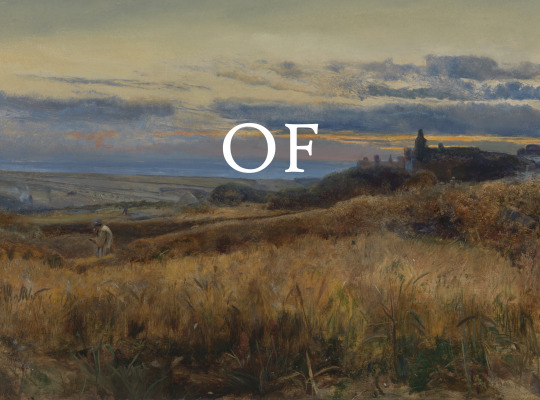

Homeland – Apollinary Vasnetsov // Landscape with a Plowed Field and a Village – Georges Michel // Via Appia at Sunset – Alexander Ivanov // Fields Near Dresden with a White Horse – Johan Christian Dahl // Landscape at Ljan – Hans Gude // Cornfield at Sunset – John William Inchbold // The Wheat Field – George Inness // The Old Witch Sleep and the Good Man Grace – The Amazing Devil
#landscape#landscape painting#the old witch sleep and the good man grace#you are in the earth of me#ruin#ruin album#ruin the amazing devil#the amazing devil#tad#ruin tad#joey batey#madeline hyland#art#art history#lyrics#lyric art
269 notes
·
View notes